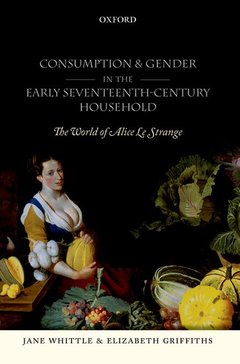Consumption and Gender in the Early Seventeenth-Century Household The World of Alice Le Strange
Langue : Anglais
Auteurs : Whittle Jane, Griffiths Elizabeth

Lady Alice Le Strange of Hunstanton in Norfolk kept a continuous series of household accounts from 1610-1654. Jane Whittle and Elizabeth Griffiths have used the Le Stranges' rich archive to reconstruct the material aspects of family life. This involves looking not only at purchases, but also at home production and gifts; and not only at the luxurious, but at the everyday consumption of food and medical care. Consumption is viewed not just as a set of objects owned, but as a process involving household management, acquisition and appropriation, a process that created and reinforced social links with craftsmen, servants, labourers, and the local community. It is argued that the county gentry provide a missing link in histories of consumption: connecting the fashions of London and the royal court, with those of middling strata of rural England. Recent writing has focused upon the transformation of consumption patterns in the eighteenth century. Here the earlier context is illuminated and, instead of tradition and stability, we find constant change and innovation. Issues of gender permeate the study. Consumption is often viewed as a female activity and the book looks in detail at who managed the provisioning, purchases, and work within the household, how spending on sons and daughters differed, and whether men and women attached different cultural values to household goods. This single household's economy provides a window into some of most significant cultural and economic issues of early modern England: innovations in trade, retail and production, the basis of gentry power, social relations in the countryside, and the gendering of family life.
1. Issues and Context. 2. Household Management. 3. The Acquisition of Goods. 4. Everyday Consumables. 5. Material Culture. 6. Family Life-Cycle and Consumption. 7. Elite Consumption. 8. The Employment of Labour. 9. Conclusion. Bibliography.
Dr Jane Whittle is a graduate of Manchester and Oxford Universities. She was appointed as a lecturer in economic and social history at Exeter University in 1995, and has since been promoted to associate professor in history. Her main area of interest is the history of everyday life in late medieval and early modern rural England and she has published on economic development, the land market, popular rebellion, servants, and women's work. Dr Elizabeth Griffiths graduated from the University of East Anglia in 1987. After a teaching career, she was appointed a Research Fellow at Exeter University in 2003 to work with Dr Jane Whittle on Lady Alice Le Strange. This was followed by a further Research Project with Prof. Mark Overton on Sharefarming in England. Her main interests lie in all aspects of early modern farming and estate management, particularly the role of women.
Date de parution : 03-2012
Ouvrage de 286 p.
16.4x24 cm
Disponible chez l'éditeur (délai d'approvisionnement : 21 jours).
Prix indicatif 164,74 €
Ajouter au panierThème de Consumption and Gender in the Early Seventeenth-Century... :
© 2024 LAVOISIER S.A.S.



